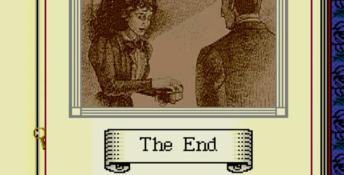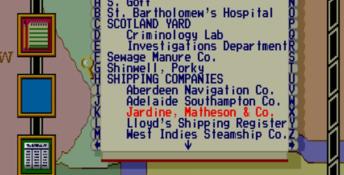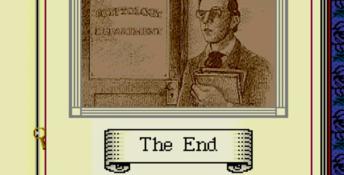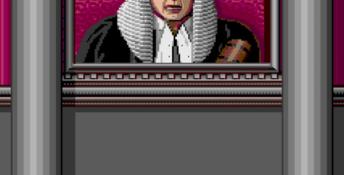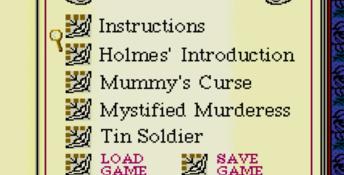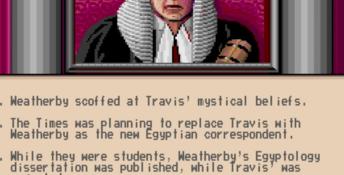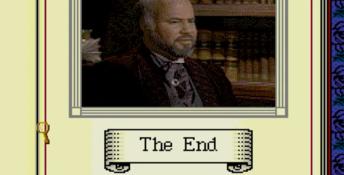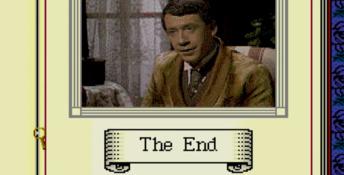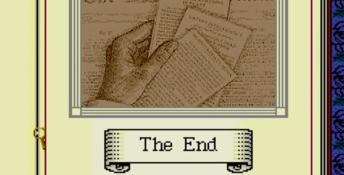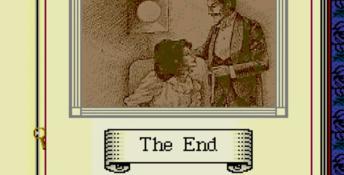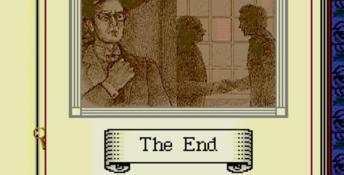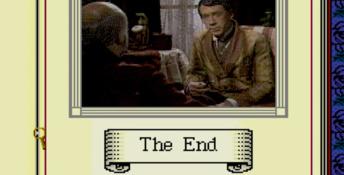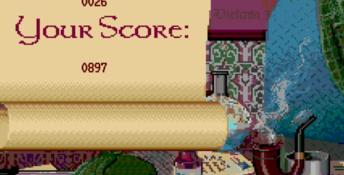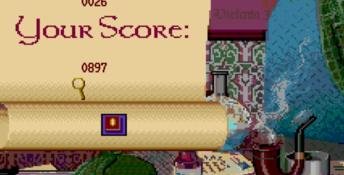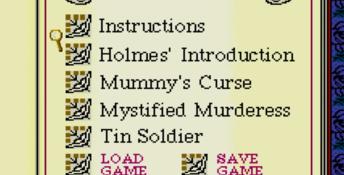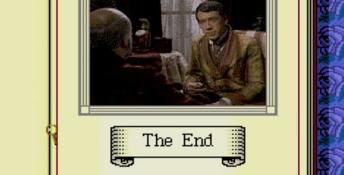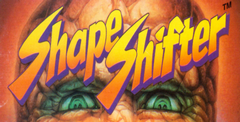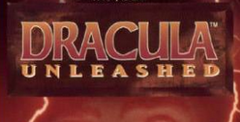Sherlock Holmes: Consulting Detective
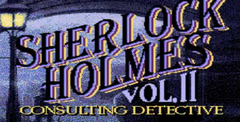
| a game by | ICOM Simulations |
| Platforms: | PC Engine (1991), Turboduo |
| Editor Rating: | 6.9/10, based on 4 reviews, 5 reviews are shown |
| User Rating: | 7.0/10 - 2 votes |
| Rate this game: | |
| See also: | Sherlock Holmes Games |
Help super snooper Sherlock Holmes solve three puzzling cases for the Duo: "The Case of the Two Lions," "The Case of the Murdered Munitions Magnate," and "The Case of the Pilfered Paintings." Using live-action video with excellent voice duplication, try and solve the mysteries with your faithful colleague Dr. Watson! If you get tired of a case you are working on, don't fret - there is a save-game option that will allow you to continue it later! Using a variety of items for collecting information, piece together your case one bit at a time, until you think you have enough evidence to take to a judge for a trial! This includes listening to all the rumors and other conversations people may be having
Download Sherlock Holmes: Consulting Detective

System requirements:
- PC compatible
- Operating systems: Windows 10/Windows 8/Windows 7/2000/Vista/WinXP

System requirements:
- PC compatible
- Operating systems: Windows 10/Windows 8/Windows 7/2000/Vista/WinXP
Game Reviews
ICOM has taken the world's most popular detective and created 3 interactive murder mysteries around him. For the first time in video game history, thanks to the huge memory in a CD, we will be able to play a game that will contain real video footage! Throw in perfect speech with synchronized lip movement and it will be difficult to believe that this is a video game!
Last month we covered Magical Dinosaur Tour, the first CD for the NEC TurboGrafx-16 that really takes advantage of CD-ROM's unique capabilities. But even Magical Dinosaur Tour seems almost primitive compared to the subject of this month's column: Sherlock Holmes: Consulting Detective. This landmark CD points the way to what could be the future of all electronic games, on all videogame and computer systems. And as soon as you play Sherlock Holmes, you'll realize that it's a future with an enormous amount of promise.
In terms of actual game play, Sherlock Holmes isn't necessarily more advanced or more impressive than earlier CD games, or even many cartridge games. In fact, it's basically a computerized version of a board game. But thanks to the capabilities of CD, the computerized version is superior to the board game, largely because it's more realistic.
Where the board game has you read a character's comments from a book, the Tur-boGrafx version allows you to meet the character on the screen with full-motion video and sound. You can actually see and hear the character's responses.
That might not seem like such a huge difference, until you realize we're not talking about conventional computer animation here. The Sherlock Holmes CD contains scenes that have been filmed and digitized. Each scene stars real actors and actresses who move, gesture, and speak, complete with a soundtrack of real voices.
The game opens, for example, with Sherlock Holmes explaining the case to you. This isn't the usual animated computer drawing, but rather a video of Holmes sitting in a chair, pipe in hand, speaking to you in a very Londonesque accent. Except for a brief pause every few moments (an unfortunate limitation of the TurboGrafx system, which can't handle the transfer of large amounts of data very quickly), it's very much like watching a movie on TV!
In fact, Sherlock Holmes is so impressive that two of my friends who have no interest in electronic games immediately wanted to jump in and play. No longer were they forced to endure a game programmer's crude renditions of human beings. Now they had full-motion video, something that's far more familiar to most people.
As you might expect, the point of Sherlock Holmes: Consulting Detective is to solve mysteries. You do this the same way Sherlock Holmes and Doctor Watson did in the famous short stories by Sir Arthur Conan Doyle - by gathering information and making deductions. In Sherlock Holmes, you can draw on such diverse sources of information as your personal files and the London Times (which, just to distract you, sometimes contains nothing of interest).
Also available are the Baker Street Irregulars, a hodge-podge collection of young toughs who, for a fee, collect information of varying reliability. Most importantly, you can personally visit suspects, witnesses, and officials.
Obviously, the more time you spend investigating, the greater your chances of solving the case. But as in real life, you are often working against severe time restrictions. This is simulated in the game by a points system. It costs only five points to turn to the Baker Street Irregulars, but a full 20 points to visit a person or a location personally. At the end of the case, you are judged according to how many points you expended to arrive at a solution. The lower your score, the better.
I'd prefer a system in which each investigative activity takes a certain (somewhat random) amount of time, but the effect of the points system is important. Even after you've solved a case, you can play it again to see if you can solve it with a better score.
The Sherlock Holmes CD includes three different cases that gradually get more complex. Greater complexity means you'll spend more time searching for and weighing evidence, which in turn means you'll expend more points before reaching a solution. When you think you've solved the mystery, you go before a judge and make your accusation. If you're right, the case is over. But if you're wrong, you accumulate additional penalty points.
Each case opens with a scene in which Holmes and his sidekick, Doctor Watson, discuss the case (or at least the beginning of it). They're usually joined by at least one other character. Your task during these introductions is to listen closely to what's being said, and to jot down the names of people, places, and any other details you think might be relevant.
Note that the information you receive here - and the information you later get from people throughout the game - is spoken aloud, not printed on the screen. You must listen to what they're saying and pay attention. Taking notes is vital.
After the introduction, the actual casework begins. The screen displays a simple "game board" with symbols representing Holmes's personal files, the Baker Street Irregulars, a horse-drawn coach, the London Times, the London Directory, and a notebook. You start your investigation by moving an on-screen pointer to one of the symbols and selecting it by pressing a button on the controller. Usually you'll begin by reading the Times. You can also read the paper copy of the Times supplied with the game, and this is often more efficient if you're a fast reader. After collecting this information, you'll turn to the notebook or the London Directory and begin sorting out clues. The notebook contains the names of important information sources, including such famous institutions as Scotland Yard (the national police). The London Directory lists dozens of names, organized alphabetically, and you must decide which of these people you wish to question, or on which people you wish to receive a report.
When you select a name, the symbols representing the horse-drawn coach, Holmes's personal files, and the Baker Street Irregulars are highlighted. You then decide which of these three information-gathering methods you will try, keeping in mind how many points they cost. If you select Holmes's files or the Irregulars, you'll get a printed report. If you choose the horse-drawn coach symbol, you'll make a personal visit to the person or location, and that leads to another movie scene.
In each scene, Holmes and/or Watson pay their visit and engage in conversation. This reveals additional information which may or may not help your case. Again, you must take notes of important details, people, and places, because you may have to follow these clues to visit other people and locations. If you visit a location that turns out to be unimportant, Holmes usually makes an understated comment that the whole trip was a waste of time.
Not only are the mysteries in Sherlock Holmes: Consulting Detective fun to solve, but the game absolutely shines in its use of CD-based multimedia. The producers (Icom Simulations) went to enormous expense to create this game, and it shows. Icom hired a cast of 35 actors, designed 25 Victorian-era sets and 70 original costumes, and wrote more than 80 pages of dialogue. Each scene features a sepia-tinted London that abounds with authentic detail, and in most respects the British accents and use of language are convincing.
If more games like Sherlock Holmes: Consulting Detective are released on Turbo CD, the CD player will quickly become a must-have accessory. As it is, Sherlock Holmes is a must-see for all electronic gamers.
Sir Arthur Conan Doyle penned the first Sherlock Holmes detective adventures way back in 1887. Now Sherlock Holmes Consulting Detective transports you via CD-ROM to 19th Century England and 222-B Baker Street, London crib of the world's first superstar supersleuth.
What's Happening, Holmes?
Sherlock Holmes Consulting Detective is a sophisticated brainteaser from NEC (see "CD Action Spinning Your Way," GamePro, February '91). The disc contains three original mysteries-The Case of the Mummy's Tomb, The Case of the Mystified Heiress, and The Case of the Tin Soldier.
Action-packed this CD definitely isn't-unless you're into heavy mental action. But the animation is outrageous! The over 95 animated scenes star real actors and use real sets to produce a TV-quality "show."
The Game's Afoot!
This CD is more than a straightforward whodunnit a'la NEC's J.B. Hairold's Mystery Club. True, you still uncover clues by relentlessly interviewing suspects, witnesses, and other characters. But the interesting twist is that you pit your detective skills against Holmes' amazing power of deduction.
A point and press icon interface puts seven sleuthing tools at your fingertips. The Newspaper usually contains valuable case info, A hardcopy edition comes bundled with the game. The Directory lists all the people and places you can visit. Highlight a name and Travel takes you there. Save key listings in the Notebook. If an interview leaves you unsatisfied, the Holmes Files might tell you more. No one home? Call the Baker Street Irregulars (your street-smart Holmes-boys) to find them. Finally, Trial takes you to court to identify the culprit.
Using Travel, the Holmes Files, or the Baker Street Irregulars adds points to your score. You try to solve a case using fewer points than Holmes. No contest-for Holmes.
You also have 11 unique sources of information including nine entertaining personalities such as H.R. Murray, an eccentric chemist, and, of course, Scotland Yard's Inspector Lestrade.
Obviously this disc emphasizes mind over reflexes, but the cumbersome interface might make you sweat. You can "rewind" scenes, but you can't fast forward. The Newspaper is a pain-use the hardcopy version.
Case Closed
If mystery is your game, Sherlock Holmes Consulting Detective is the name. The cases are hot, and you'll learn to live with the interface. If you aspire to be a great detective, this game will definitely take you to school-elementary, of course.
ProTips:
- Travel costs the most points, so listen very carefufly and take notes.
- The Baker Street Irregulars can find out info you can't.
- People you interrogate never change their stories.
- If you're stuck, try going to Trial. This screen means you've got the hot clues. The judge's queries might help.
There was a chill in the air as the rain poured down outside my window, a perfect night for a good mystery. And what better location for an evening of sleuthing than the streets of London? Tagging along with Sherlock Holmes no less! With notebook paper, pen and cookies at hand, I was ready for action.
Those of you looking for the kind of action that only an itchy trigger finger can provide, read no further. Sherlock Holmes: Consulting Detective is a game for thinkers, patient ones at that. If you're a mystery lover who sometimes likes to skip to the end to find your culprit, you might find this game irritating at times. To solve the mysteries you must play through to the very end--no giving up! You'll start the game out with a pep talk from Sherlock Holmes. In a digitized scene of footage of a live actor, Holmes comes to life on the screen, imparting his advice to you before you set off on your first case. There are three mysteries to solve: the mummy's curse, the mystified murderess and the tin soldier. Each mystery begins with a digitized scene featuring Holmes and Watson discussing the case. After you've been briefed, you're on your own.
Your resources are a notebook containing the names of the Baker Street Regulars (a varied group of observant informants), a directory of London, a newspaper, Holmes' own files, the Baker Street Irregulars (youths who will seek out clues for you) and a carriage to take you from clue to clue. Everything is explained in the documentation. There is no annoying sound track to distract you as you solve your case; thankfully, the only sounds you'll hear after the opening sequence music are voices of characters as clues are uncovered.
The game interface is simple to use and straightforward, but sometimes frustrating. Going back and forth from place to place can be tiring, especially since the little buttons on the directory are not so easy to hit without a mouse. There are a lot of red herrings to be found (too many I thought), but nestled amongst them are clues that you must investigate.
Should any of you cocky investigators think you have enough information to solve the case at too early a stage in the game, the judge will tell you so and send you back to gather more clues. Sigh. Here's where the patience comes in. Unthinking detective that I was, I never saved my game after the first four hours of playing, and the next day I had to go back and re-gather all my clues before the judge would let me solve the mystery. Holmes would never have neglected such a detail.
In fact, detail is one of the main features that recommends this game. When you uncover a due, a digitized scene with costumed actors in sumptuous, period settings appears. Not so appealing is being told that some brilliant deduction you've made is "a complete waste of time" as you stare at an etching of a closed door. Still, even though some of your investigations may not yield digitized scenes or important information, you might learn a little about London.
At times I found myself investigating almost everyone in the directory. By doing this I racked up my points. The goal in Sherlock Holmes is to solve the game in as few points as possible. Reading the newspaper and interviewing the Regulars in your notebook will not give you points, but traveling from place to place in the directory, opening Holmes' files and getting the help of the Irregulars will. Unlike most video games, you will not have a constant reminder of your score, but will find out how you did in the end. It seems that the journey is more important than the destination. In this aspect, the game definitely resembles a computer game more than your typical video game fare, and it will probably appeal more to the adult gamer than the average youngster (although mystery-loving teens can handle it).
After playing my first game, my score was ludicrously high, but I suppose the idea is that the player will want to go back and try and re-solvethe mystery using less points. If that doesn't appeal to you, then you should perhaps pass on the game when you're done. Then again, you might want to call a friend over to help you solve the mysteries.
Despite its flaws, I found Sherlock Holmes to be an enjoyable game, although you might have to wait for Holmes'final explanation of the case to understand what happened, even after you've solved it! (And frankly, without giving anything away, I thought some of the characters' motives for murder were a little silly.) If you love cracking cases and you've got time and patience, check this one out.
